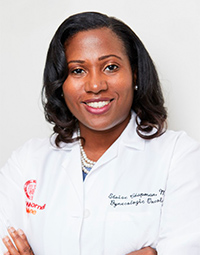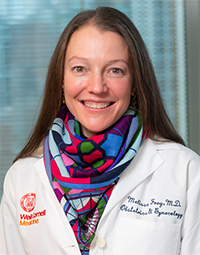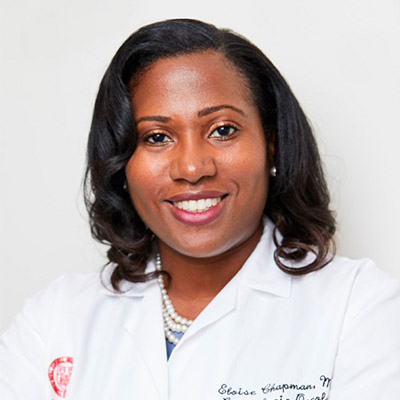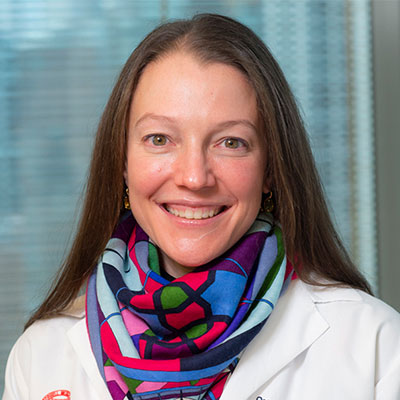Genetic testing for hereditary cancer syndromes can identify individuals carrying a pathogenic variant that increases risk for diseases such as breast and ovarian cancer before they develop, thus maximizing disease prevention and early detection. Cascade testing refers to the process of starting with the proband (or the first person in the family found to have the genetic variant) and extending genetic testing to the proband's at‐risk relatives. Those relatives who are discovered to carry the familial pathogenic variant can greatly benefit from intensive surveillance and risk‐reducing surgery. For example, for women with BRCA1/2 pathogenic variants, risk‐reducing bilateral salpingo‐oophorectomy and bilateral mastectomy are associated with a reduced risk of breast cancer, and salpingo‐oophorectomy is associated with a decreased risk of ovarian cancer and a dramatically lower mortality rate.

Dr. Eloise Chapman-Davis

Dr. Melissa Frey
The Office of Public Health Genomics of the Centers for Disease Control and Prevention has selected cascade genetic testing as a tier one genomic application for hereditary breast and ovarian cancer as well as for Lynch syndrome. And yet, the literature suggests that only about a third of at‐risk relatives follow through with the suggested genetic testing. In 2020, Eloise Chapman-Davis, MD, Director of Gynecologic Oncology, and Melissa K. Frey, MD, a gynecologist oncologist, in the Department of Obstetrics and Gynecology at NewYork-Presbyterian/
While this increased use of genetic testing is encouraging, it is only clinically significant if the relatives act following the receipt of positive genetic testing results. With this in mind, Dr. Frey and Dr. Chapman-Davis conducted a two-year follow-up investigation to measure the long‐term utilization of targeted cancer prevention and quality of life among the at‐risk relatives offered cascade genetic testing in the first study.
In the current study, the researchers re-contacted the relatives that had enrolled in the initial pilot study and were found on genetic testing to carry the familial cancer-associated pathogenic variant. The relatives were asked whether or not their genetic testing results had prompted completion of the cancer screening interventions or surgeries that were recommended on the basis of the National Comprehensive Cancer Network (NCCN) guidelines.
Our long‐term follow‐up study demonstrates that clinician‐facilitated cascade testing can result in the successful completion of genetic testing and utilization of genetically targeted primary disease prevention through screening and risk‐reducing surgery.
— Dr. Eloise Chapman-Davis, Dr. Melissa Frey, and study authors
Ninety-five at-risk relatives were enrolled in the initial pilot study, and 72 (76 percent) participated in the two-year follow-up investigation. Of the 95 relatives, 57 (79 percent) had completed genetic testing. The results of the follow-up study, which were published in the October 27, 2022, issue of Cancer, showed:
- 25 of the 57 relatives (44 percent) harbored an inherited pathogenic variant
- Guideline-based cancer surveillance was recommended to 18 relatives who were informed that their affected gene, age, biologic sex, and personal medical history rendered them candidates for cancer surveillance based on NCCN guidelines
- 13 of these 18 relatives (72 percent) completed at least one recommended screening
- 6 relatives (33 percent) completed all recommended screenings
- Risk-reducing surgery was recommended to 10 relatives, with 4 (40 percent) completing a total of 8 procedures, including bilateral salpingo‐oophorectomy (4), hysterectomy (3), and mastectomy (1)
- Quality-of-life surveys demonstrated low levels of anxiety, depression, distress, and uncertainty
Dr. Chapman-Davis and Dr. Frey and their research colleagues demonstrated that cascade testing offers the ability to extend genetic testing and disease prevention to disease‐free, at‐risk relatives and thus strengthen the potential benefits of cancer genetics. “As the true power of genetic testing relies on the translation of a positive testing result into cancer prevention and early detection, our results suggest that genetic navigation programs might consider focusing on both facilitating cascade genetic testing and encouraging affected individuals to engage with the medical system,” wrote the authors.
Since the inception of genetic sequencing technology, there has been discussion that testing could bring about psychological distress. However, the Weill Cornell Medicine researchers assessed the long‐term quality of life and the psychosocial effects of clinician‐facilitated cascade testing on the study relatives and confirmed low levels of anxiety and depression and high levels of satisfaction with the experience.




